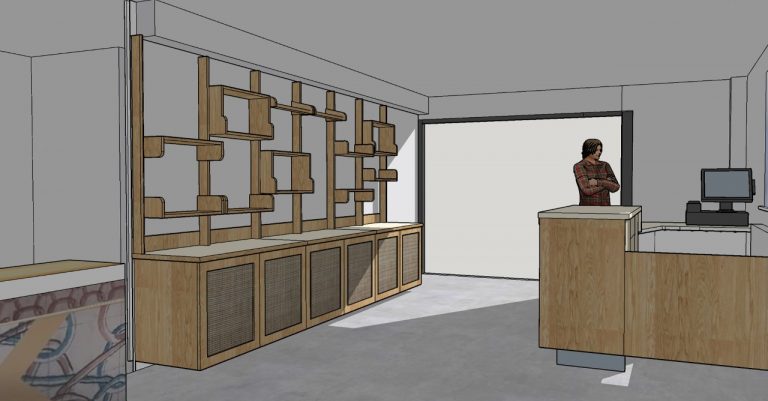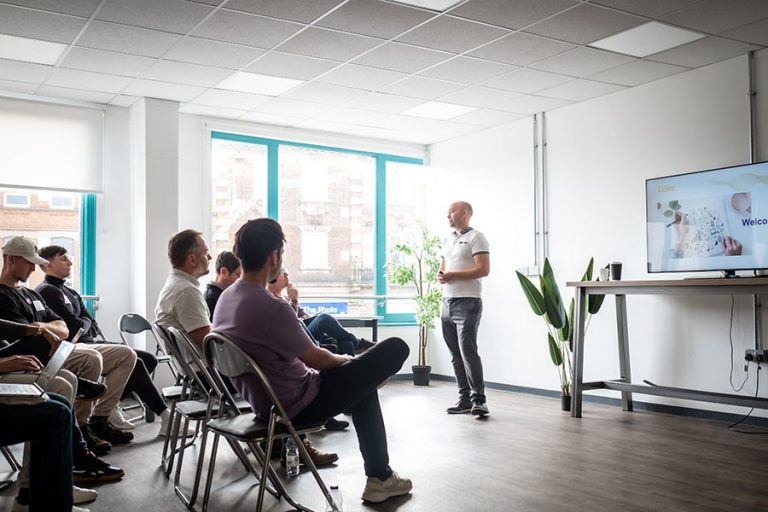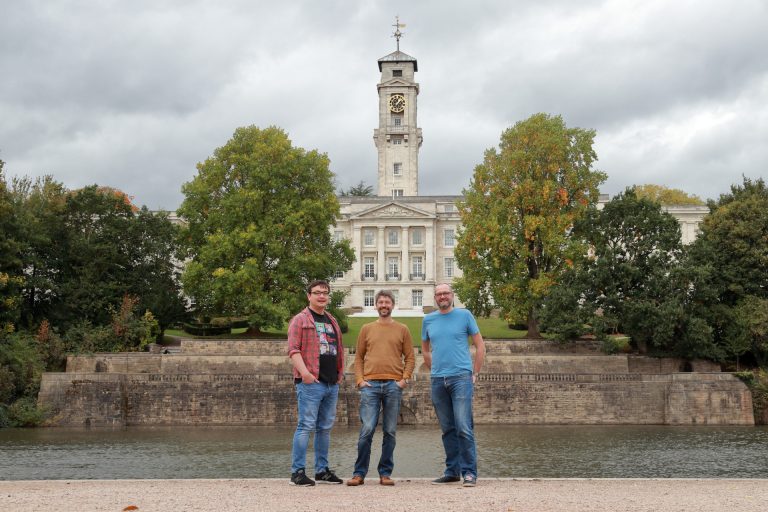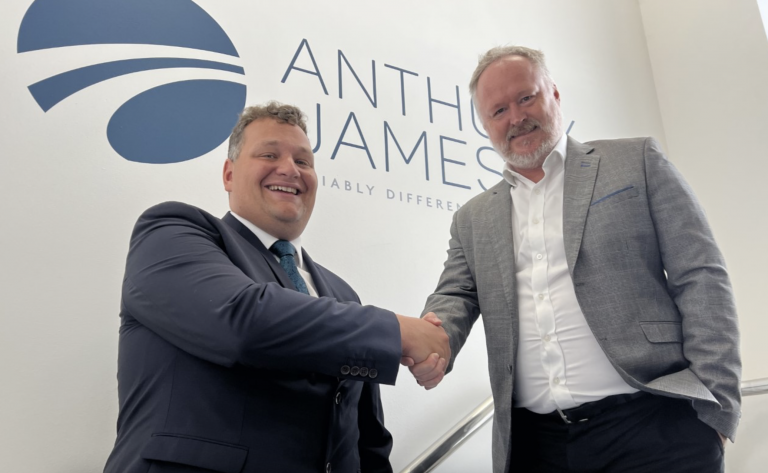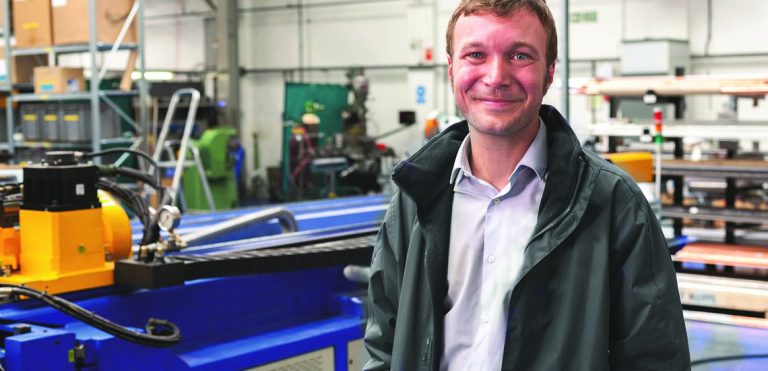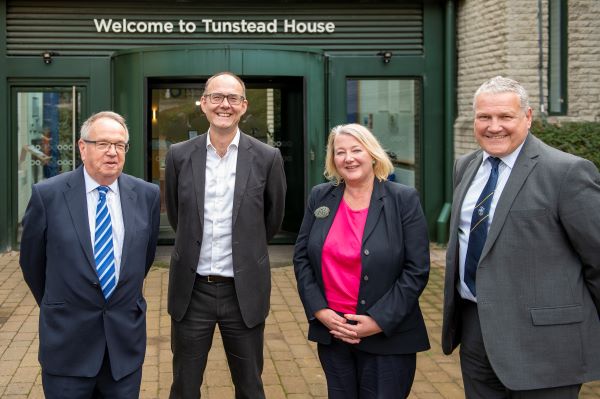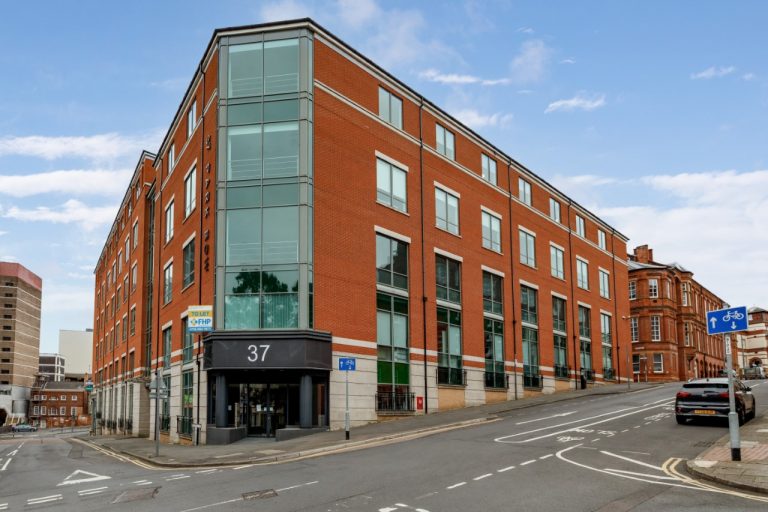Monthly fall in corporate insolvencies masking true economic picture
Lettings of premium new build units boosts Leicester’s trade counter offering
Nottingham museum receives £8k to help fund new shop front
High demand for places as more new businesses inducted at Loughborough start-up incubator
Twenty-four new businesses have been accepted onto the autumn cohort for Leicestershire start-up incubator LUinc.
A total of 81 founders expressed interest in applying for one of 20 available places. The cohort was extended to 24 members.
Since 2011, the incubator has worked with Loughborough University graduates and researchers on developing new businesses.
Last year, its services were extended to founders from outside of the campus as part of a partnership with the Leicester and Leicestershire Enterprise Partnership (LLEP) and Charnwood Borough Council.
The project aims to develop a new generation of local businesses which are ‘fit for the future’ in their agility, focus on emerging markets, and commitment to scale-up and growth.
LUinc. provides a six-month programme aiming to increase productivity and job creation by incubating innovative new businesses.
Of the 24, fifteen local entrepreneurs were accepted for the project’s third cohort after applying from outside of the university ecosystem. The remaining nine are graduate start-ups and research spinouts.
Members benefit from free weekly meetings, one-to-one coaching, structured training, and roundtable discussions delivered by a range of experienced experts and entrepreneurs.
The first two cohorts helped launch 12 new businesses, supported 304 individuals through events or 1-2-1s, and steered 24 businesses to enterprise or start-up support.
Sirius Transformation joined LUinc. in the Spring of 2022 after making an initial inquiry through the Careers and Enterprise Hub in Loughborough town centre.
Founded in late 2021 by former 3M employees James Whyley and Steven Sleath, Sirius is a manufacturing process improvement consultancy based on its founders’ extensive regulated industry experience. It now operates UK-wide.
James, from Loughborough, said: “We’ve gained a lot from the camaraderie with fellow entrepreneurs and also having that natural rhythm to our working days that we had when working within a corporate environment but might have lost had we decided to start up from home.”
Steven, from Syston, said: “We have gone from an idea to a fully functioning business while part of LUinc.”
Pete Hitchings, incubator manager, said: “Bringing together businesses from the University and the local area has grown a diverse community of business owners who are really invested in helping one another to succeed.”
Dr Nik Kotecha OBE, chair of the LLEP Innovation Board, said: “It’s essential for any economy to have productive and innovative small businesses and entrepreneurs.
“Programmes such as those at LUinc. are retaining and developing bright new business ideas, which is so important in the wake of the pandemic.”
Cllr Jonathan Morgan, leader of Charnwood Borough Council, said: “It is great to see so many start-up companies seeking support from LUinc. and we look forward to seeing them grow and develop in the future.
“As a Council, we’re committed to creating a thriving economy; small businesses are often central to that and that’s why we are keen to support them.”
The ongoing project was part-funded with £314,000 from a Covid-19 Recovery Fund, created using Enterprise Zone Business Rates.
LUinc. is now accepting expressions of interest for its Spring 2023 cohort.
New Business Gateway report reveals needs of Leicester’s Black Business Community
- The black community is Leicester’s fastest growing ethnic community.
- The main communication issue appears to be that large parts of the community are not aware of the support that is already available from the Business Gateway and others.
- There is a lack of active business networks for the Black Business Community in Leicester.
- Funding is a very big issue for this community. There is a lack of generational wealth (i.e. help from parents) and a lack of ‘financial education’ about where to find the right type of funding.
- Black enterprises typically only survive for 3 years as opposed to the 7 years for Leicester’s average businesses.
- Black female businesspeople are under-represented in this community.
- The local Somali business landscape is far more varied than the black business community in Leicester in general in terms of its variety.
- Increasingly engagement where gaps exist. For example, the Business Gateway have agreed to provide a workshop for Somali founders to support the existing business network.
- Speaking to banks or other finance providers about finance pathways. This includes local grant providers which would help address the issues around taking on debt.
- Ensuring business support information is cascaded via wider networks, including those highlighted in the report.
- Engaging more frequently with business leaders in the community around strategy and inclusivity.
- Ensuring BAME businesses are reached by forthcoming new LLEP and Business Gateway business support programmes.
- Reignite networking and peer support for local black owned businesses.
- A report on finance options specifically aimed at the black community.
- Workshops in a highlighted area, for example financial literacy.
Nottingham healthtech company raises £3.4m to transform mental health diagnoses
University of Leicester unveils £150m student village
Growing Derbyshire company acquires popular local pub
Rising costs and falling revenues causing worst small business pessimism outside lockdowns, new figures reveal
Local businesses raise over £8,000 for Vicky McClure’s Our Dementia Choir
Members of the East Midlands business community came together at the annual CAPs (construction and property) charity golf day at Springwater Golf Club in Calverton, raising £8,500 for Our Dementia Choir.
88 players from local businesses were in attendance, across 22 teams, who played the course as well as testing their abilities in additional activities including a putting competition and a beat the pro game.
Monies were raised for the charity through ticket sales, hospitality around the course and a raffle.
Our Dementia Choir was formed by actress Vicky McClure in 2019, as part of a BBC documentary, as she set out on a journey to discover the true extent of music’s power of combatting dementia – following the death of her grandmother in 2015, who suffered with the condition.
Vicky formed the choir, which is made up of those living with dementia, in her hometown of Nottingham and supports them through singing and musical activities to provide a calm, engaging and friendly space for the community.
Businesses from across the construction and property sector were in attendance, with Blueprint Interiors, Jennie Holland PR, Influence Landscape Planning & Design, 200 Degrees Coffee, Pygott and Crone, Morgan Sindall, Hexa Consulting and GT3 Architects, who sponsored the event.
Coastal Distillery, a Lincolnshire-based business that makes a range of artisan spirits, donated drinks for the halfway house and 200 Degrees supplied coffee and cakes on the course.
At the end of the tournament, Our Dementia Choir was introduced to the players by Vicky McClure and charity manager, Karen Bonser and they performed four songs.
Prizes were given to the winners of both the individual and team competitions, which included rounds of golf at Springwater Golf club, gift vouchers for the onsite golf shop, champagne and PING golfing attire.
CAPs, which was founded in 2017 by John Tansur, client services director at Knights, and David Ford, director at Gleeds, has so far raised a total of £35,000 through a number of fundraising events, with further plans to host a black-tie dinner “with a twist,” a school sports style event and a racing Ladies Day in 2023.
David Ford said: “We’re really pleased so many from the construction and property sector came along to play golf, network, and have fun raising funds for such an incredible charity. John and I are very grateful for everyone’s generosity in raising such a huge amount of money for Our Dementia Choir and to the sponsors of the event. The performance from the choir was definitely the highlight so a big well done to all that sang for us on the day.”
Karen Bonser said: “We are thrilled the CAPs event raised £8,500 for Our Dementia Choir. These funds will enable the choir to reach out to many people living with dementia, of all ages, and support their families. We were honoured to bring awareness of dementia to the event and show the players and supporters how music can really make a huge difference.”
Funds doubled to £200k to help support Ukrainian refugees in Nottinghamshire
200 Degrees turns ten
200 Degrees Coffee gathered at its Nottingham Roast House last week, with colleagues and friends, to celebrate ten years in business.
The coffee roaster has been on quite a journey since the company began in 2012, having opened 17 coffee shops – with its latest in Derby opening next month – six barista schools, launching a home subscription and ecommerce service, significantly investing in its Roast House, reaching 200 team members and recently welcoming four new roles to its central operations team.
Held at the company’s Roast House on Meadow Lane, the event marked and celebrated the 10-year milestone and thanked the 200 Degrees team – some of which have been with the company since its inception – its suppliers, partners, loyal customers and others that have played a part in the coffee roaster’s success.
The jam-packed evening was filled with 200 Degrees’ signature coffee blends, Espresso Martinis and street food from local vendors. Guests also had the chance to try their hand at latte art and win a Sage coffee machine, as well as guided tours of its newly refurbished Roast House and a roasting experience with head roaster, Mike Steele.
To top off the evening, the company shared an exclusive preview of its new coffee packaging ahead of its launch to market in November.
Co-founders Rob Darby and Tom Vincent set up 200 Degrees from the corner of a garage before it moved on to its roastery on Meadow Lane – opposite the Notts County Football Stadium – and since its inception the company has expanded its footprint across the Midlands, North and Wales.
CEO Rob said: “200 Degrees was born out of wanting to solve a problem. Tom and I wanted to find better coffee, service and training, and after struggling to find it, we decided to become the solution.
“Ten years later and we are operating with a team of just over 200 people, which is what I am most proud of. There’s huge pride in running a business with a team of this scale – from accountants and sales managers to roasters and packers in the warehouse.
“We knew we wanted to open a number of coffee shops, but it has grown beyond that and we’re getting ready to open our 18th shop. There will be more to come, and we will continue to do what we’re doing but better and more sustainably, to evolve the brand and create experiences for everyone to remember.
“We’d like to thank everyone that joined us to celebrate ten incredible years and we look forward to what the next ten brings for 200 Degrees!”
Anthony James restructures management team as Boorman becomes CEO
Loughborough-based insurance broker, Anthony James, has announced strategic changes within the structure of its senior management team.
The restructure sees current Managing Director Steve Boorman become CEO, with sales director Jacob Duckworth moving into the MD role.
The news is the latest move as the firm consolidates it position in the market following the acquisition of Nottingham counterpart Bale Insurance Brokers back in the spring.
Speaking about the changes, Steve Boorman said: “We have ambitious plans for sustainable growth in terms of the team, our business and our associated businesses. A big part of that wider picture is working with, developing and promoting incredible talent and Jacob is a perfect illustration of that.
“In a market known for consolidation, we are fiercely independent. Maintaining that independence requires the creation and development of a thriving culture within the organisation. Jacob, Leonie Rainbow (operations director) and Liudmila Matvievskaia (finance director) are leading that charge and I’m proud to have worked with them as they have built their careers in the industry together here at Anthony James.”
Jacob Duckworth added: “I am immensely proud to be moving into a role that Steve has created, thrived in and developed over these past years. We are ‘reliably different’ as a company and certainly as an insurance brokerage and that is down to the values that Steve has helped to instil right across the team and into our entire philosophy as a company.
“Fortunately for me, I will be working very closely with Steve, Leonie and Liudmila to continue in this spirit of innovation, customer-centric thinking and frankly, just doing things differently, to develop our client offering and experience further still.”




